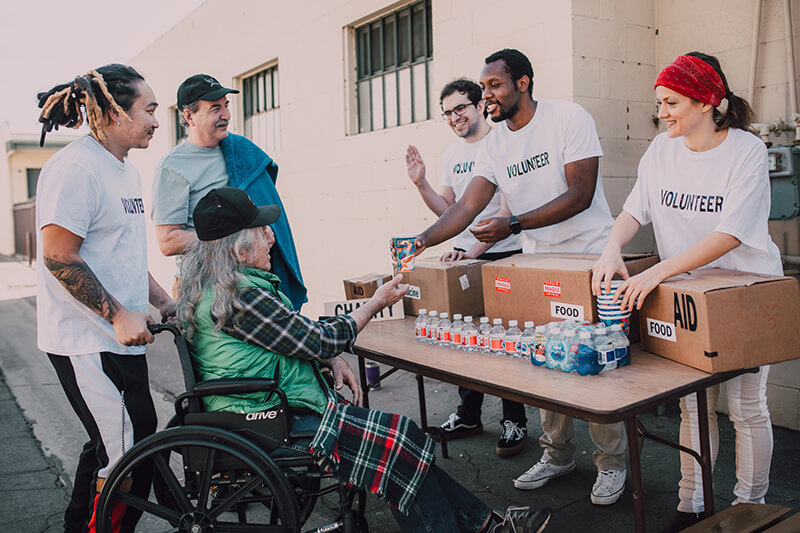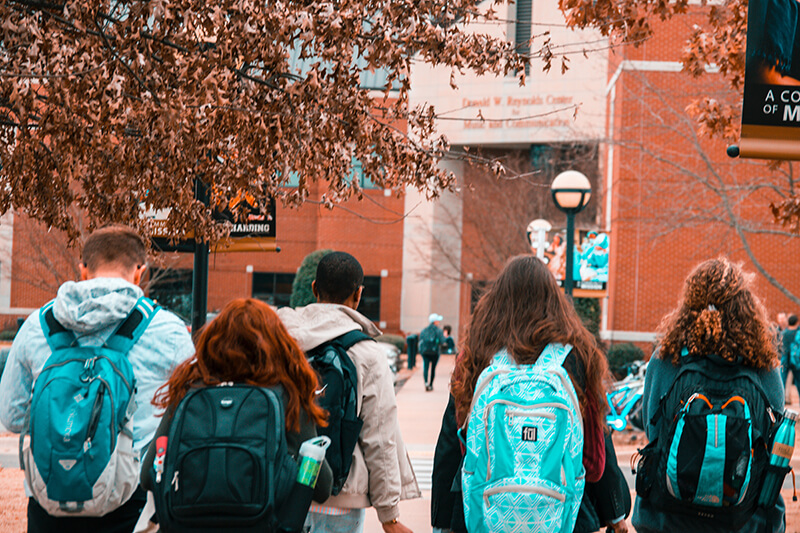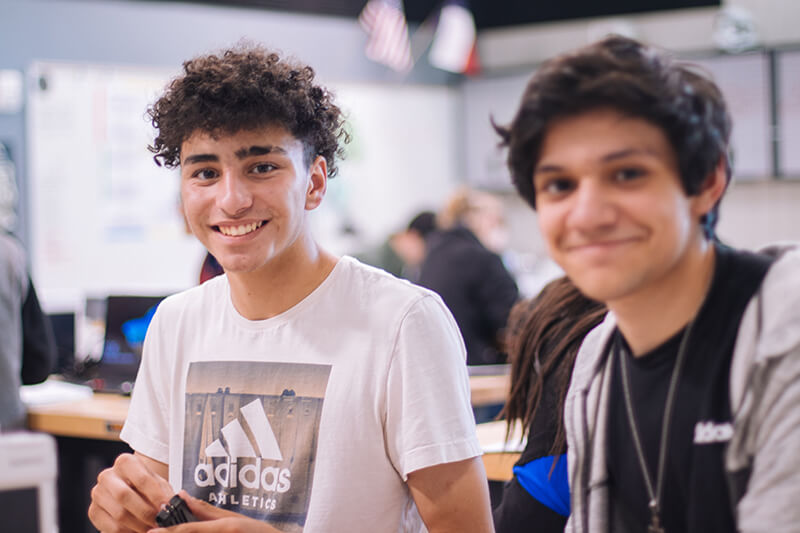
How to Make Friends in University – And Keep Them For Life
 Learning how to make friends after high school is tough for anyone, especially when you’re starting out at college or university and are already thrown into an entirely new environment.
Learning how to make friends after high school is tough for anyone, especially when you’re starting out at college or university and are already thrown into an entirely new environment.
When you’re starting school in that entirely new environment, it’s tough to build up the confidence to really put yourself out there and seek out new friends. This is especially true if you moved to a new city and don’t really know anyone yet.
Some of the best friends you will ever have in your life are the people you’ll meet in university. High school friends are great, but university and college is where you’ll form those new friendships with people who are on your level and aligned with your goals and interests. That’s why it’s so important to know how to talk to people and be open to new friendships, experiences, and connections.
These tips will help you learn how to make friends in university, and most importantly, keep them close for the rest of your life.

The Benefits of New Friendships at School
Learning how to make friends at school comes with a wide range of benefits aside from just having people to hang out with. Here are just a few of the advantages in making new friendships and maintaining strong relationships with those friends.
● Building like-minded connections: In high school, you’re often limited to your community and classmates within your school. When you get to college or university, you’re suddenly open to a world of new people with tons of different lifestyles, cultural backgrounds, common interests, and so much more. It’s a lot easier to find people with interests closer to your own this way.
● Achieving a good work life balance: Making friends at school is a key component of building a social life, and in turn, a social life is a key component of a productive work life balance. This is key when it comes to avoiding student burnout and overworking yourself during your academic years.
● Helping with loneliness and depression: Friends are a major component for your mental health. Loneliness and depression are two things that commonly plague many university and college students, especially in the first year when that homesickness kicks in. You can’t always control depression, but making new friends and curbing your loneliness can drastically reduce the symptoms of depression or burnout.
● Making you happier and more positive in general: Multiple scientific studies have shown that having friends can actually make you happier, healthier, and enhance the quality of your life. Friends offer important moral support, help reduce stress when times get tough, and make you feel loved and valued. Not only that, but surrounding yourself with happy, positive people will ultimately make you a happier, more positive person, too.
Taking a Lesson From Dale Carnegie
One of the most well-known and prominent pieces of literature on the subject of how to make friends is Dale Carnegie’s book How to Win Friends and Influence People. In fact, you’ve likely already heard of it because it’s considered a cornerstone text for interpersonal relationships.
While Dale Carnegie’s book is geared more toward people in business and networking, there are quite a few points he makes that can apply to making new friends at school. In fact, many of his points can help you with a variety of your relationships, from friendships to family relations and even your interactions in the workplace during school or after graduation.
Some takeaways from How to Win Friends and Influence People you can use to your own advantage include:
● Show genuine interest in other people and listen to what they have to say.
● Be appreciative of other people and make sure they know you appreciate them.
● Don’t be critical of others or complain. Being forgiving of others’ errors shows true character and genuine friendship.
● When you’re beginning a new friendship, find common ground and start there.
● Make people feel important and offer praise when it’s warranted.

A Few Tips to Keep in Mind Before You Make New Friends
Here are some tips on how to make friends at college or university that you’ll want to keep in mind when you’re starting to get out there and meet people.
Make the first move. Don’t wait for other people to approach you. They might be just as nervous as you are to strike up a conversation, and waiting for each other to do something first will leave you in a stalemate.
Don’t rush new friendships. You’ve got at least four years to develop those relationships and potentially become best friends. If you start getting pushy and demanding of peoples’ time, you’ll start to drive them away.
Get out of your comfort zone. You’re not going to meet many new people if you keep doing the same things with the same people over and over again because you’re too intimidated to branch out. When you limit yourself to just what’s in your comfort zone, you’re missing out on some amazing opportunities to try new things and meet more people.
Know when to draw the line. Putting yourself out there is great, but pay attention to the vibes you’re giving and receiving. Are you being pushy and inserting yourself into conversations you aren’t involved in? Does someone feel like they’re giving you the cold shoulder? If so, take a step back and give them some breathing room.

How to Make Friends on Campus
Here are some great ideas for how to make friends at school:
● Join a club: A club is the best and easiest way to meet people who share the same interests as you. If you can’t find a club focused around something you’re interested in, start one yourself! Even if you have a very niche interest, chances are there’s at least a few other people around campus who enjoy it, too.
● Volunteer: Being a student volunteer can bring you a lot of happiness and fulfillment, and it’s also a great way to meet new people.
● Play a sport: Joining a sports team is a great way to meet people who share the love of the game with you (and get some exercise in). Even if you aren’t a top athlete, join an intramural sports league or a local recreational league for a more laid back experience.
● Chat with your classmates: When you’re sitting in class waiting for the lecture to start, strike up a conversation with the classmate beside you. Introduce yourself, ask them a bit about themselves, or even just discuss the class itself.
● Form a study group: Reach out to people before or after class and arrange a study group. If they already belong to one, ask them if you can join. You’ll be able to help each other out and possibly bond over the course material.
● Attend campus events: Every campus hosts weekly or monthly events that provide plenty of opportunities to go and meet new people. Get out there and attend your school’s movie nights, guest lectures, paint nights, or anything else that’s on the agenda. Don’t worry about going alone; it’s actually better to show up solo as you have more free time to spend talking to people and forming new friendships.
● Visit people in your dorm: When in doubt, go and knock on doors in your dorm or residence building. Yes, this can be a little nerve wracking, but it’s a great way to just introduce yourself to other people who may also be too nervous to approach you first.
No matter what type of method you try to meet new friends, remember that you’re still at school to get your degree and pass your courses. Don’t overbook yourself and join every single club or group because this will become very difficult to manage as you get deeper in the semester and your assignments start to pile up.
The Best Places to Meet New People at School
While the above points are common ways to make new friends at college or university, there are plenty of other places you can go to meet people. In fact, you can make new friends just about anywhere you go if you put yourself out there and talk to people along the way.
Here are some options you can try:
● The campus gym
● Coffee shops or campus cafes
● Your student centre
● Part-time jobs or internships, especially those on campus
● Religious or spiritual services
● Local hotspots such as museums, art galleries, restaurants, or bars
● Protests or demonstrations for things you’re passionate about
● Festivals or local events
● Online gaming communities

Using Social Media to Your Advantage
Social media can have some serious downsides when it comes to student mental health and social anxiety. However, it can have some great advantages in forming and maintaining new friendships at school.
If you’re starting university or college for the first time, check to see if your university has a Facebook group for students starting this year. Sometimes you can find Facebook groups for your specific residence or graduating class and make connections ahead of time so you know some people before you get there. This will help to ease some of the pressure during your first few weeks.
Another thing you can try is searching up your roommate ahead of time on social media. When schools make dorm assignments, they might be able to give you the name of your future roommate. If not, you can try checking to see if those Facebook groups exist for your campus and connecting with other people to see who has been assigned the same room as you. Not only will this help you get to know the person you’ll be stuck in close quarters with, but it’ll also help you coordinate what you’re bringing so you don’t end up with two of everything.
Staying in Touch With High School Friends
Just because you’re branching out and making new friendships in university or college doesn’t mean that you shouldn’t keep your high school friends close. In fact, you should absolutely make sure those friendships are still on your mind and valuable to your life.
The first and most obvious way to stay in touch is to visit each other at school. Most dorms on campus let you have overnight visitors if you sign them in properly. Just make sure your friends follow the rules and don’t get you in trouble because you’ll be entirely responsible for any visitors you have.
If you moved to a school in a new city that’s far away, it can be tricky to coordinate visiting time with your high school friends back home. This is where video chatting software and apps like FaceTime, Zoom, and Google Hangouts can be a real friendship saver. Make time each week or every other week for a catch up session over video chat, or make a group chat so everyone can stay in the loop.

Making Friends When Studying Abroad
A big deterrent that prevents people from signing up for study abroad programs is the idea of being alone in a completely new country without any friends there. This is a valid point – making friends as an international student is twice as hard as it is for local students.
Here are some quick tips for international students on meeting new people and making friends in a foreign or unfamiliar place:
● Think of the people you meet as future friends, and not as foreign strangers. This puts you in the mindset to be a little more open and optimistic.
● Learn that country’s native language and use it, even if you know your language skills aren’t very strong yet. The more you practice, the better you’ll get, and locals will appreciate your effort.
● Attend campus events, clubs, or programs just like you would at your school back home.
● If you’re religious, find a local church or spiritual organization to practice your faith and meet like minded people at the same time.
● Explore your new city by foot and don’t be afraid to ask locals you meet along the way to recommend things to do, places to eat, sights to see, and anything else that interests you.
● Research your new country’s culture beforehand. The last thing you want to do is break a cultural taboo without meaning to.
If you need some more pointers on making friends as an international student, check out Episode 17 of the Homework Help Show Student Influencers Podcast. We spoke with Tynika Thornton, who was fresh off a year of studying abroad and shared her experiences in making new friends and building a community when she moved to a new country.

Tips For Striking up a Good Conversation
One thing you’re going to want to do when learning how to make friends at school is make sure you work on improving your people skills. Try some of these tips below to increase your conversational abilities and connect with people on a deeper level.
Show interest in their life. Ask people what they’re interested in and get them to tell you about it. If they’re an international student who moved to a new country for school, ask them where they’re from and get them to tell you about their culture. This is also a great way to learn something new and gain some worldly experience.
Ask questions. Questions show interest in peoples’ lives, and help you carry on a conversation. Pick up on something they mention and ask them more about it. For example, if they mention that they have a sibling, ask them about their sibling. How old are they? What was it like growing up with that sibling? What does that sibling do now?
Choose activities that allow you time to have a conversation. Some things are better than others for getting to know someone. For example, go for dinner or drinks instead of the movies because you can actually spend time getting to know one another instead of sitting quietly in a dark theatre. Find an activity you both enjoy, and do that together.
Use body language. Make eye contact when someone is talking to you. Lean forward if you can’t quite hear what they’re saying or if you’re in a loud environment to make sure you catch the details they tell you. Stand up straight and show confidence. You should also pay attention to their own body language to make sure you’re on the same page.

The 5 Types of Friends You Need to Avoid
Not all new friends are equal. While it’s essential to make new friends and make the most of this new era in your life, it’s equally as essential to make sure you avoid the types of friends who are going to bring negativity to your life or drag you down.
1. The Non-Stop Partier: While it’s fun to have people to go out and party with, avoid or limit your time with the ones who do nothing but that. These types of friends tend to be a bad influence and can actually lead you down a dark path if you aren’t careful. They might also begin to get in the way of your balance and if you spend too much time with them, your grades might suffer in return.
2. The Sometimes Friend: This type of friend shows up when it’s convenient for them, but not always when you need them most. They expect you to drop everything when they want you to, but when you’re facing a hard time, you’ll be hard pressed to even get a text back. That’s not what real friendship is all about, and if your friends start doing this to you, it’s best to drop them because they don’t value you the way they should.
3. The Moocher: Friendship is a give and take situation, but this type of friend is all about the take and not so much about the give. If you find yourself in a one-sided friendship where you are just being taken advantage of, it’s likely a moocher and your best bet is to avoid spending too much time with them.
4. The Negativity King/Queen: Avoid the types of friends who seem to never have anything positive to say about anything or anyone. If you spend too much time around negative people, you’ll inevitably become a negative and unhappy person yourself.
5. The Soap Opera Character: This type of person is so full of drama they basically live in a soap opera, and it can seem as though they’re always involved in some kind of situation either at home, at work, when going out, or at school. Usually, this type of person requires constant attention and can drain your energy very fast. You may also unintentionally find yourself involved in their drama.
Despite the toxic friends we just discussed above, it’s important to remember that you should always be open at first. Don’t be too quick to judge people. Just because you don’t like someone’s personal style doesn’t mean that they aren’t worth your friendship. When your new friends start to give you a reason to judge them or be concerned, such as displaying those toxic traits above, then you can start to limit your interactions with them.

The Importance of Being Yourself
One of the key things you need to remember when it comes to making new friends and meeting new people is that you should always be yourself. This isn’t high school, where you may feel the need to fit in with the cool crowd or try to impress the popular kids (which isn’t always the best option, either).
If your friends aren’t going to like you for who you really are, they aren’t worth your friendship in the first place. Further, if you pretend to be someone you aren’t, you’ll attract people who aren’t compatible with the real you and you won’t be able to form real, meaningful friendships.
The concept of faking it until you make it doesn’t really work with friendship because at some point in time, you’re going to get caught faking it. When you’re putting on a facade, it’s difficult to relate to people in the long term because it’s easy to let something slip or get caught up in a lie, and once you do get caught, your friends will feel like you’ve deceived them – and it’s pretty tough to come back from something like that.
Keeping Long Distance Friends After Graduation
Once you’ve figured out how to make friends during your time in school, there’s one last thing you’re going to want to know: how to keep those new friendships long after you graduate and go your separate ways.
With long distance friends, communication is key. Keep in touch regularly, whether it’s sending each other funny Snapchat pictures or having a weekly video chat to catch up on your lives. With the tools and technology we have nowadays, like social media and smartphones, this is easier than ever.
Make a point to have a big reunion once a year, or more than that if your schedules and the distance between you allow for it. Get everyone together and rent a cottage, have an annual pool party, arrange to have someone host everyone for the weekend, or take a road trip. If you’re going to have someone host the group, make sure you rotate and take turns hosting.

Focus on Your Friends While we Focus on Your Schoolwork
One of the biggest issues that comes with learning how to make friends in college or university is actually having or finding the time to let those new friendships blossom. When you’re feeling piled up with schoolwork, essays, and studying, it can be difficult to fit everything in.
At Homework Help Global, we know how important your friends are to you. That’s why we provide services, tools, and resources to help make your school life easier, while freeing up time to let those new friendships blossom. We offer a wide range of quality academic writing services for any aspect of your course, from custom written essays to resumes, application letters, PowerPoint presentations, and so much more.
Order your next assignment now with just one click, or get a free quote from our operations team.
Share:

